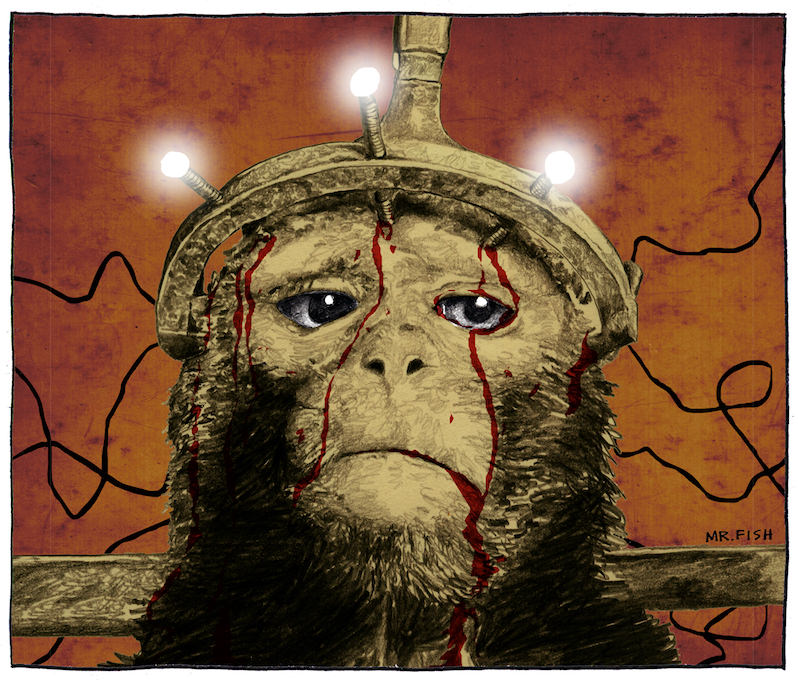A Nation of the Walking Dead
Donald Trump mastered the techniques of turning desperate gamblers at his casinos into zombies, techniques he used to become president. Mr. Fish / Truthdig
Mr. Fish / Truthdig
Mr. Fish / Truthdig
Opioids and experiences that simulate the deadening effects of narcotics are mechanisms to keep us submissive and depoliticized. Desperate citizens in Aldous Huxley’s 1932 novel “Brave New World” ingested the pleasure drug soma to check out of reality. Our own versions of soma allow tens of millions of Americans to retreat daily into addictive mousetraps that generate a self-induced autism.
The United States consumes 80 percent of opioids used worldwide, and more than 33,000 died in this country in 2015 from opioid overdoses. There are 300 million prescriptions written and $24 billion spent annually in the U.S. for painkillers. Americans supplement this mostly legal addiction with over $100 billion a year in illicit marijuana, cocaine, methamphetamine and heroin. And nearly 14 million U.S. adults, one in every 13, regularly abuse alcohol.
But these monetary figures are far less than what we spend on gambling. Americans in 2013 lost $119 billion gambling, with an additional $70 billion—or $300 for every adult in the country—spent on lottery tickets.
Federal and state governments, reliant on tax revenues from legal gambling and on lottery ticket sales, will do nothing to halt the expansion of the industry or the economic and psychological toll it exacts on those in financial distress. State-run lottery games had sales of $73.9 billion in 2015, according to the North American Association of State and Provincial Lotteries. This revenue is vital to budgets beset by declining incomes, deindustrialization and austerity. “State lotteries provided more revenue than state corporate-income taxes in 11 of the 43 states where they were legal, including Delaware, Rhode Island, and South Dakota,” Derek Thompson wrote in The Atlantic. “The poorest third of households buy half of all lotto tickets,” he noted. Gambling is a stealth tax on poor people hoping to beat the nearly impossible odds. Governmental income from gambling is an effort to make up for the taxes the rich and corporations no longer pay.
Slot machines and other electronic gambling devices are engineered to draw us into an Alice-in-Wonderland rabbit hole. They, like our personal computers and hand-held devices, cater to the longing to flee from the oppressive world of dead-end jobs, crippling debt and social stagnation and a dysfunctional political system. We become rats in a Skinner box, frantically pulling levers until we are addicted and finally entranced by our compulsion to achieve fleeting, intermittent and adrenaline-driven rewards. Much like what happens to people using slot machines, the pigeons or rats in Skinner’s experiments that did not know when they would get a reward, or how much they would get, became the most heavily addicted to operating the levers or pedals. Indeed, Skinner used slot machines as a metaphor for his experiments.
The engineers of America’s gambling industry are as skillful at forming addiction as the country’s top five opioid producers—Purdue Pharma, Johnson & Johnson, Insys Therapeutics, Mylan and Depomed. There are 460 commercial casinos, 486 tribal casinos, 350 card rooms, 55 racetracks and hundreds of thousands of gaming devices, many located in convenience stores, gas stations, bars, airports and even supermarkets.
The rush of anticipation, available in 20-second bursts, over hours, days, weeks and months creates an addictive psychological “zone” that the industry calls “continuous gaming productivity.” Heart rates and blood pressure rise. Time, space, the value of money and human relationships hypnotically dissolve. A state of extreme social isolation occurs.
Gambling addicts, like many addicts, are often driven to crime, bankruptcy and eventual imprisonment. Many lose everything—their marriages, their families, their jobs, their emotional health and sometimes their lives. Gambling addicts have the highest rate of suicide attempts among addicts of any kind—1 in 5, or 20 percent—according to the National Council on Problem Gambling.
Donald Trump is in large part a product of gambling culture. His career has not been about making products but about selling intangible and fleeting experiences. He preys on the desperate by offering them escapist fantasies. This world is about glitter, noise and hype—Trump called the Trump Taj Mahal, his now-closed casino, “the eighth wonder of the world.” The more money you spent, the greater your “value,” the more you were pampered, given free hotel rooms and gifts, handed passes to special “clubs” with lavish buffets. Scantily clad hostesses hovered around you serving complimentary drinks. If you spent big, you were invited to exclusive parties attended by supermodels and famous athletes. Decorated chips—some featuring a photo of Donald Trump—turned cash into a species of Monopoly money. But in the end, when you were broke, when there was no more money in your bank account and your credit cards were maxed out, you were thrown back, in even greater financial distress, into the dreary universe you tried to obliterate. Roger Caillois, the French sociologist, wrote that the pathologies of a culture are captured in the games the culture venerates. Old forms of gambling such as blackjack and poker allowed the gambler to take risks, make decisions and even, in his or her mind, achieve a kind of individualism or heroism at the gambling table. They provided a way, it can be argued, to assert an alternative identity for a brief moment. But the newer form, machine gambling, is an erasure of the self. Slot machines, which produce 85 percent of the profits at casinos, are, as the sociologist Henry Lesieur wrote, an “addiction delivery device.” They are “electronic morphine,” “the crack cocaine of gambling.” They are not about risk or about making decisions, but about creating somnambulism, putting a player into a trancelike state that can last for hours. It is a pathway, as sociologist Natasha Dow Schüll points out, to becoming the walking dead. This yearning for a state of nonbeing is what Sigmund Freud called “the death instinct.” It is the overpowering drive by a depressed and traumatized person to seek pleasure in a self-destructive activity that ultimately kills the organism.
“It is not the chance of winning to which they become addicted,” Schüll writes in “Addiction by Design: Machine Gambling in Las Vegas,” “rather, what addicts them is the world-dissolving state of subjective suspension and affective calm they derive from machine play.”
Gamblers are closely tracked by the casino industry. The length of time gamblers spend on machines increases the profits for the casino. The science of keeping people in front of slot machines—called “time on device” within the industry—has led to the creation of ergonomic consoles, the appealing, warm screens on slot machines, seductive video graphics and surround-sound acoustics.
The industry also invests heavily in surveillance. Gamblers carry player or loyalty cards. They insert these cards into the slot machines when they play. These cards, linked to a central database, are used by the industry to build profiles of gamblers. The value and frequency of bets are captured, along with wins and losses. The industry knows when the players take breaks, where and what they eat in the casinos, what they drink and what hotel rooms they select. Slowly the traits and the habits of the gambler, triangulated with demographic data, are pieced together to allow the industry to build a personal profile. With the profile, the casino determines at what point a player will accumulate too many losses and too much pain and is about to walk away from a machine. A few moments before that pain level is reached, a hostess will magically appear with a free drink, a voucher for a meal or tickets to a show. Casinos can also use profiles to project how much a player will spend gambling during his or her lifetime.
The industry was the human laboratory for refinements now incorporated into the security and surveillance organs of the state. “Many surveillance and marketing innovations first used in casinos were only later adapted to other domains,” Schüll writes, “including airports, financial trading floors, consumer shopping malls, insurance agencies, banks, and government programs like Homeland Security.”
“They have an algorithm that senses your pain points, your sweet spots,” Schüll told me. “The zone is a term that I kept hearing over and over again as I went to gamblers’ anonymous meetings and spoke to gambling addicts. This really describes a state of flow where time, space, monetary value and other people fall away. You might say a state of flow, or the zone, sounds very different from the thrills and suspense of gambling. But what the casinos have hit upon is that [they] actually make more money when [they] design a flow space into these machines. People don’t even know that they’re losing. They just sit there. Again, it’s time on machines.”
“When you look at contemporary slot machines, they don’t operate on volatility,” she continued. “One designer of the mathematics and algorithm of these games said we want an algorithm that makes you feel like you are reclining on a couch. The curves, architecture and the softly pixelated lights, they want you to sit back and go with the flow. I just couldn’t make sense of that for the longest time in my research. Gamblers would say, ‘It’s so weird, but sometimes when I win a big jackpot I feel angry and frustrated.’ What they’re playing for is not to win, but to stay in the zone. Winning disrupts that because suddenly the machine is frozen, it’s not letting you keep going. What are you going to do with that winning anyway? You’re just going to feed it back into the machines. This is more about mood modulation. Affect modulation. Using technologies to dampen anxieties and exit the world. We don’t just see it in Las Vegas. We see it in the subways every morning. The rise of all of these screen-based technologies and the little games that we’ve all become so absorbed in. What gamblers articulate is a desire to really lose a sense of self. They lose time, space, money value, and a sense of being in the world. What is that about? What does that say? How do we diagnose that?”“It’s the flip side to the incredible pressure, which is experienced as a burden, to self-manage, to make choices, to always be maximizing as you’re living life in this entrepreneurial mode,” she said. “We talk about this as the subjective side of the neoliberal agenda, where pressure is put on individuals to regulate themselves. In this case, they are regulating themselves, but they are regulating themselves away from that. This really is a mode of escape. It’s not action gambling. This is escape gambling. You can see it on their faces. The consequences and ethics are distasteful. It’s predatory. It’s predation on a type of escape where people are driven to exit the world. They’re not trying to win. The casinos are trying to win. They are trying to make revenue. They’re kind of in a partnership with the gamblers, but it’s a very asymmetrical partnership. The gamblers don’t want to win. They want to just keep going. Some people have likened gamblers to factory workers who are alienated by the machine. I don’t see it that way. This is more about machines designed to synchronize with what you want—in this case escape—and [to] profit from that.”
Trump understands this longing for escape and the art of creating an updated version of P.T. Barnum’s “Grand Traveling Museum, Menagerie, Caravan & Hippodrome.” Trump used his skills as a con artist to pull in hundreds of millions of dollars and then to achieve the presidency.
“People have called it a mode of ludo-capitalism,” Schüll said. “In a way, you can connect that to the ludo-politics that we see. Pleasure. To get what you want. What you want is to escape into a flow, to be taken away. We see this in the political domain a lot—in the rallies, in the surging of feelings, the distraction. If you look at the way a casino is designed, and you remember that Trump is a designer of many casinos, including his non-casino properties, they follow the same design logic of disorientation and trying to sweep people away from themselves, away from rationality, away from a position where they have clear lines of sight and can act as decision-making subjects. You see that on the floors of casinos, you see that in political rhetoric today.”
The corporate state will expand our access to a variety of opioids and numbing situations to temporarily alleviate our stress, financial dislocations, depression and anxiety. Aided by state and local governments, it will build new pleasure palaces. It will lure millions into its glittering and seductive Venus’ flytraps. It will make sure we have tempting retreats within easy reach to achieve a death-in-life experience. Much of the society will be put to sleep. Those who refuse to become zombies, who rise up to resist, who seek at all costs to remain distinct individuals, will be silenced with the corporate state’s cruder tool for submission: force.
With an uncertain future and a new administration casting doubt on press freedoms, the danger is clear: The truth is at risk.
Now is the time to give. Your tax-deductible support allows us to dig deeper, delivering fearless investigative reporting and analysis that exposes what’s really happening — without compromise.
Stand with our courageous journalists. Donate today to protect a free press, uphold democracy and unearth untold stories.






You need to be a supporter to comment.
There are currently no responses to this article.
Be the first to respond.